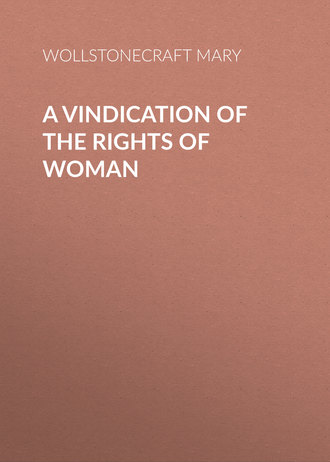 полная версия
полная версияA Vindication of the Rights of Woman
Fate, however, breaks this tie. She is left a widow, perhaps, without a sufficient provision: but she is not desolate! The pang of nature is felt; but after time has softened sorrow into melancholy resignation, her heart turns to her children with redoubled fondness, and anxious to provide for them, affection gives a sacred heroic cast to her maternal duties. She thinks that not only the eye sees her virtuous efforts, from whom all her comfort now must flow, and whose approbation is life; but her imagination, a little abstracted and exalted by grief, dwells on the fond hope, that the eyes which her trembling hand closed, may still see how she subdues every wayward passion to fulfil the double duty of being the father as well as the mother of her children. Raised to heroism by misfortunes, she represses the first faint dawning of a natural inclination, before it ripens into love, and in the bloom of life forgets her sex—forgets the pleasure of an awakening passion, which might again have been inspired and returned. She no longer thinks of pleasing, and conscious dignity prevents her from priding herself on account of the praise which her conduct demands. Her children have her love, and her brightest hopes are beyond the grave, where her imagination often strays.
I think I see her surrounded by her children, reaping the reward of her care. The intelligent eye meets her's, whilst health and innocence smile on their chubby cheeks, and as they grow up the cares of life are lessened by their grateful attention. She lives to see the virtues which she endeavoured to plant on principles, fixed into habits, to see her children attain a strength of character sufficient to enable them to endure adversity without forgetting their mother's example.
The task of life thus fulfilled, she calmly waits for the sleep of death, and rising from the grave may say, behold, thou gavest me a talent, and here are five talents.
I wish to sum up what I have said in a few words, for I here throw down my gauntlet, and deny the existence of sexual virtues, not excepting modesty. For man and woman, truth, if I understand the meaning of the word, must be the same; yet the fanciful female character, so prettily drawn by poets and novelists, demanding the sacrifice of truth and sincerity, virtue becomes a relative idea, having no other foundation than utility, and of that utility men pretend arbitrarily to judge, shaping it to their own convenience.
Women, I allow, may have different duties to fulfil; but they are HUMAN duties, and the principles that should regulate the discharge of them, I sturdily maintain, must be the same.
To become respectable, the exercise of their understanding is necessary, there is no other foundation for independence of character; I mean explicitly to say, that they must only bow to the authority of reason, instead of being the MODEST slaves of opinion.
In the superior ranks of life how seldom do we meet with a man of superior abilities, or even common acquirements? The reason appears to me clear; the state they are born in was an unnatural one. The human character has ever been formed by the employments the individual, or class pursues; and if the faculties are not sharpened by necessity, they must remain obtuse. The argument may fairly be extended to women; for seldom occupied by serious business, the pursuit of pleasure gives that insignificancy to their character which renders the society of the GREAT so insipid. The same want of firmness, produced by a similar cause, forces them both to fly from themselves to noisy pleasures, and artificial passions, till vanity takes place of every social affection, and the characteristics of humanity can scarcely be discerned. Such are the blessings of civil governments, as they are at present organized, that wealth and female softness equally tend to debase mankind, and are produced by the same cause; but allowing women to be rational creatures they should be incited to acquire virtues which they may call their own, for how can a rational being be ennobled by any thing that is not obtained by its OWN exertions?
CHAPTER 4.
OBSERVATIONS ON THE STATE OF DEGRADATION TO WHICH WOMAN IS REDUCED BY VARIOUS CAUSES
That woman is naturally weak, or degraded by a concurrence of circumstances is, I think, clear. But this position I shall simply contrast with a conclusion, which I have frequently heard fall from sensible men in favour of an aristocracy: that the mass of mankind cannot be any thing, or the obsequious slaves, who patiently allow themselves to be penned up, would feel their own consequence, and spurn their chains. Men, they further observe, submit every where to oppression, when they have only to lift up their heads to throw off the yoke; yet, instead of asserting their birthright, they quietly lick the dust, and say, let us eat and drink, for to-morrow we die. Women, I argue from analogy, are degraded by the same propensity to enjoy the present moment; and, at last, despise the freedom which they have not sufficient virtue to struggle to attain. But I must be more explicit.
With respect to the culture of the heart, it is unanimously allowed that sex is out of the question; but the line of subordination in the mental powers is never to be passed over. Only "absolute in loveliness," the portion of rationality granted to woman is, indeed, very scanty; for, denying her genius and judgment, it is scarcely possible to divine what remains to characterize intellect.
The stamina of immortality, if I may be allowed the phrase, is the perfectibility of human reason; for, was man created perfect, or did a flood of knowledge break in upon him, when he arrived at maturity, that precluded error, I should doubt whether his existence would be continued after the dissolution of the body. But in the present state of things, every difficulty in morals, that escapes from human discussion, and equally baffles the investigation of profound thinking, and the lightning glance of genius, is an argument on which I build my belief of the immortality of the soul. Reason is, consequentially, the simple power of improvement; or, more properly speaking, of discerning truth. Every individual is in this respect a world in itself. More or less may be conspicuous in one being than other; but the nature of reason must be the same in all, if it be an emanation of divinity, the tie that connects the creature with the Creator; for, can that soul be stamped with the heavenly image, that is not perfected by the exercise of its own reason? Yet outwardly ornamented with elaborate care, and so adorned to delight man, "that with honour he may love," (Vide Milton) the soul of woman is not allowed to have this distinction, and man, ever placed between her and reason, she is always represented as only created to see through a gross medium, and to take things on trust. But, dismissing these fanciful theories, and considering woman as a whole, let it be what it will, instead of a part of man, the inquiry is, whether she has reason or not. If she has, which, for a moment, I will take for granted, she was not created merely to be the solace of man, and the sexual should not destroy the human character.
Into this error men have, probably, been led by viewing education in a false light; not considering it as the first step to form a being advancing gradually toward perfection; (This word is not strictly just, but I cannot find a better.) but only as a preparation for life. On this sensual error, for I must call it so, has the false system of female manners been reared, which robs the whole sex of its dignity, and classes the brown and fair with the smiling flowers that only adorn the land. This has ever been the language of men, and the fear of departing from a supposed sexual character, has made even women of superior sense adopt the same sentiments. Thus understanding, strictly speaking, has been denied to woman; and instinct, sublimated into wit and cunning, for the purposes of life, has been substituted in its stead.
The power of generalizing ideas, of drawing comprehensive conclusions from individual observations, is the only acquirement for an immortal being, that really deserves the name of knowledge. Merely to observe, without endeavouring to account for any thing, may, (in a very incomplete manner) serve as the common sense of life; but where is the store laid up that is to clothe the soul when it leaves the body?
This power has not only been denied to women; but writers have insisted that it is inconsistent, with a few exceptions, with their sexual character. Let men prove this, and I shall grant that woman only exists for man. I must, however, previously remark, that the power of generalizing ideas, to any great extent, is not very common amongst men or women. But this exercise is the true cultivation of the understanding; and every thing conspires to render the cultivation of the understanding more difficult in the female than the male world.
I am naturally led by this assertion to the main subject of the present chapter, and shall now attempt to point out some of the causes that degrade the sex, and prevent women from generalizing their observations.
I shall not go back to the remote annals of antiquity to trace the history of woman; it is sufficient to allow, that she has always been either a slave or a despot, and to remark, that each of these situations equally retards the progress of reason. The grand source of female folly and vice has ever appeared to me to arise from narrowness of mind; and the very constitution of civil governments has put almost insuperable obstacles in the way to prevent the cultivation of the female understanding: yet virtue can be built on no other foundation! The same obstacles are thrown in the way of the rich, and the same consequences ensue.
Necessity has been proverbially termed the mother of invention; the aphorism may be extended to virtue. It is an acquirement, and an acquirement to which pleasure must be sacrificed, and who sacrifices pleasure when it is within the grasp, whose mind has not been opened and strengthened by adversity, or the pursuit of knowledge goaded on by necessity? Happy is it when people have the cares of life to struggle with; for these struggles prevent their becoming a prey to enervating vices, merely from idleness! But, if from their birth men and women are placed in a torrid zone, with the meridian sun of pleasure darting directly upon them, how can they sufficiently brace their minds to discharge the duties of life, or even to relish the affections that carry them out of themselves?
Pleasure is the business of a woman's life, according to the present modification of society, and while it continues to be so, little can be expected from such weak beings. Inheriting, in a lineal descent from the first fair defect in nature, the sovereignty of beauty, they have, to maintain their power, resigned their natural rights, which the exercise of reason, might have procured them, and chosen rather to be short-lived queens than labour to attain the sober pleasures that arise from equality. Exalted by their inferiority (this sounds like a contradiction) they constantly demand homage as women, though experience should teach them that the men who pride themselves upon paying this arbitrary insolent respect to the sex, with the most scrupulous exactness, are most inclined to tyrannize over, and despise the very weakness they cherish. Often do they repeat Mr. Hume's sentiments; when comparing the French and Athenian character, he alludes to women. "But what is more singular in this whimsical nation, say I to the Athenians, is, that a frolic of yours during the Saturnalia, when the slaves are served by their masters, is seriously continued by them through the whole year, and through the whole course of their lives; accompanied too with some circumstances, which still further augment the absurdity and ridicule. Your sport only elevates for a few days, those whom fortune has thrown down, and whom she too, in sport, may really elevate forever above you. But this nation gravely exalts those, whom nature has subjected to them, and whose inferiority and infirmities are absolutely incurable. The women, though without virtue, are their masters and sovereigns."
Ah! why do women, I write with affectionate solicitude, condescend to receive a degree of attention and respect from strangers, different from that reciprocation of civility which the dictates of humanity, and the politeness of civilization authorise between man and man? And why do they not discover, when "in the noon of beauty's power," that they are treated like queens only to be deluded by hollow respect, till they are led to resign, or not assume, their natural prerogatives? Confined then in cages, like the feathered race, they have nothing to do but to plume themselves, and stalk with mock-majesty from perch to perch. It is true, they are provided with food and raiment, for which they neither toil nor spin; but health, liberty, and virtue are given in exchange. But, where, amongst mankind has been found sufficient strength of mind to enable a being to resign these adventitious prerogatives; one who rising with the calm dignity of reason above opinion, dared to be proud of the privileges inherent in man? and it is vain to expect it whilst hereditary power chokes the affections, and nips reason in the bud.
The passions of men have thus placed women on thrones; and, till mankind become more reasonable, it is to be feared that women will avail themselves of the power which they attain with the least exertion, and which is the most indisputable. They will smile, yes, they will smile, though told that—
"In beauty's empire is no mean,And woman either slave or queen,Is quickly scorn'd when not ador'd."But the adoration comes first, and the scorn is not anticipated.
Lewis the XIVth, in particular, spread factitious manners, and caught in a specious way, the whole nation in his toils; for establishing an artful chain of despotism, he made it the interest of the people at large, individually to respect his station, and support his power. And women, whom he flattered by a puerile attention to the whole sex, obtained in his reign that prince-like distinction so fatal to reason and virtue.
A king is always a king, and a woman always a woman: (And a wit, always a wit, might be added; for the vain fooleries of wits and beauties to obtain attention, and make conquests, are much upon a par.) his authority and her sex, ever stand between them and rational converse. With a lover, I grant she should be so, and her sensibility will naturally lead her to endeavour to excite emotion, not to gratify her vanity but her heart. This I do not allow to be coquetry, it is the artless impulse of nature, I only exclaim against the sexual desire of conquest, when the heart is out of the question.
This desire is not confined to women; "I have endeavoured," says Lord Chesterfield, "to gain the hearts of twenty women, whose persons I would not have given a fig for." The libertine who in a gust of passion, takes advantage of unsuspecting tenderness, is a saint when compared with this cold-hearted rascal; for I like to use significant words. Yet only taught to please, women are always on the watch to please, and with true heroic ardour endeavour to gain hearts merely to resign, or spurn them, when the victory is decided, and conspicuous.
I must descend to the minutiae of the subject.
I lament that women are systematically degraded by receiving the trivial attentions, which men think it manly to pay to the sex, when, in fact, they are insultingly supporting their own superiority. It is not condescension to bow to an inferior. So ludicrous, in fact, do these ceremonies appear to me, that I scarcely am able to govern my muscles, when I see a man start with eager, and serious solicitude to lift a handkerchief, or shut a door, when the LADY could have done it herself, had she only moved a pace or two.
A wild wish has just flown from my heart to my head, and I will not stifle it though it may excite a horse laugh. I do earnestly wish to see the distinction of sex confounded in society, unless where love animates the behaviour. For this distinction is, I am firmly persuaded, the foundation of the weakness of character ascribed to woman; is the cause why the understanding is neglected, whilst accomplishments are acquired with sedulous care: and the same cause accounts for their preferring the graceful before the heroic virtues.
Mankind, including every description, wish to be loved and respected for SOMETHING; and the common herd will always take the nearest road to the completion of their wishes. The respect paid to wealth and beauty is the most certain and unequivocal; and of course, will always attract the vulgar eye of common minds. Abilities and virtues are absolutely necessary to raise men from the middle rank of life into notice; and the natural consequence is notorious, the middle rank contains most virtue and abilities. Men have thus, in one station, at least, an opportunity of exerting themselves with dignity, and of rising by the exertions which really improve a rational creature; but the whole female sex are, till their character is formed, in the same condition as the rich: for they are born, I now speak of a state of civilization, with certain sexual privileges, and whilst they are gratuitously granted them, few will ever think of works of supererogation, to obtain the esteem of a small number of superior people.
When do we hear of women, who starting out of obscurity, boldly claim respect on account of their great abilities or daring virtues? Where are they to be found? "To be observed, to be attended to, to be taken notice of with sympathy, complacency, and approbation, are all the advantages which they seek." True! my male readers will probably exclaim; but let them, before they draw any conclusion, recollect, that this was not written originally as descriptive of women, but of the rich. In Dr. Smith's Theory of Moral Sentiments, I have found a general character of people of rank and fortune, that in my opinion, might with the greatest propriety be applied to the female sex. I refer the sagacious reader to the whole comparison; but must be allowed to quote a passage to enforce an argument that I mean to insist on, as the one most conclusive against a sexual character. For if, excepting warriors, no great men of any denomination, have ever appeared amongst the nobility, may it not be fairly inferred, that their local situation swallowed up the man, and produced a character similar to that of women, who are LOCALIZED, if I may be allowed the word, by the rank they are placed in, by COURTESY? Women, commonly called Ladies, are not to be contradicted in company, are not allowed to exert any manual strength; and from them the negative virtues only are expected, when any virtues are expected, patience, docility, good-humour, and flexibility; virtues incompatible with any vigorous exertion of intellect. Besides by living more with each other, and to being seldom absolutely alone, they are more under the influence of sentiments than passions. Solitude and reflection are necessary to give to wishes the force of passions, and enable the imagination to enlarge the object and make it the most desirable. The same may be said of the rich; they do not sufficiently deal in general ideas, collected by impassionate thinking, or calm investigation, to acquire that strength of character, on which great resolves are built. But hear what an acute observer says of the great.
"Do the great seem insensible of the easy price at which they may acquire the public admiration? or do they seem to imagine, that to them, as to other men, it must be the purchase either of sweat or of blood? By what important accomplishments is the young nobleman instructed to support the dignity of his rank, and to render himself worthy of that superiority over his fellow citizens, to which the virtue of his ancestors had raised them? Is it by knowledge, by industry, by patience, by self-denial, or by virtue of any kind? As all his words, as all his motions are attended to, he learns an habitual regard for every circumstance of ordinary behaviour, and studies to perform all those small duties with the most exact propriety. As he is conscious how much he is observed, and how much mankind are disposed to favour all his inclinations, he acts, upon the most indifferent occasions, with that freedom and elevation which the thought of this naturally inspires. His air, his manner, his deportment all mark that elegant and graceful sense of his own superiority, which those who are born to an inferior station can hardly ever arrive at. These are the arts by which he proposes to make mankind more easily submit to his authority, and to govern their inclinations according to his own pleasure: and in this he is seldom disappointed. These arts, supported by rank and pre-eminence, are, upon ordinary occasions, sufficient to govern the world. Lewis XIV. during the greater part of his reign, was regarded, not only in France, but over all Europe, as the most perfect model of a great prince. But what were the talents and virtues, by which he acquired this great reputation? Was it by the scrupulous and inflexible justice of all his undertakings, by the immense dangers and difficulties with which they were attended, or by the unwearied and unrelenting application with which he pursued them? Was it by his extensive knowledge, by his exquisite judgment, or by his heroic valour? It was by none of these qualities. But he was, first of all, the most powerful prince in Europe, and consequently held the highest rank among kings; and then, says his historian, 'he surpassed all his courtiers in the gracefulness of his shape, and the majestic beauty of his features. The sound of his voice noble and affecting, gained those hearts which his presence intimidated. He had a step and a deportment, which could suit only him and his rank, and which would have been ridiculous in any other person. The embarrassment which he occasioned to those who spoke to him, flattered that secret satisfaction with which he felt his own superiority.' These frivolous accomplishments, supported by his rank, and, no doubt, too, by a degree of other talents and virtues, which seems, however, not to have been much above mediocrity, established this prince in the esteem of his own age, and have drawn even from posterity, a good deal of respect for his memory. Compared with these, in his own times, and in his own presence, no other virtue, it seems, appeared to have any merit. Knowledge, industry, valour, and beneficence, trembling, were abashed, and lost all dignity before them."
Woman, also, thus "in herself complete," by possessing all these FRIVOLOUS accomplishments, so changes the nature of things,
—"That what she wills to do or saySeems wisest, virtuousest, discreetest, best;All higher knowledge in HER PRESENCE fallsDegraded. Wisdom in discourse with herLoses discountenanc'd, and like folly shows;Authority and reason on her wait."—And all this is built on her loveliness!
In the middle rank of life, to continue the comparison, men, in their youth, are prepared for professions, and marriage is not considered as the grand feature in their lives; whilst women, on the contrary, have no other scheme to sharpen their faculties. It is not business, extensive plans, or any of the excursive flights of ambition, that engross their attention; no, their thoughts are not employed in rearing such noble structures. To rise in the world, and have the liberty of running from pleasure to pleasure, they must marry advantageously, and to this object their time is sacrificed, and their persons often legally prostituted. A man, when he enters any profession, has his eye steadily fixed on some future advantage (and the mind gains great strength by having all its efforts directed to one point) and, full of his business, pleasure is considered as mere relaxation; whilst women seek for pleasure as the main purpose of existence. In fact, from the education which they receive from society, the love of pleasure may be said to govern them all; but does this prove that there is a sex in souls? It would be just as rational to declare, that the courtiers in France, when a destructive system of despotism had formed their character, were not men, because liberty, virtue, and humanity, were sacrificed to pleasure and vanity. Fatal passions, which have ever domineered over the WHOLE race!
The same love of pleasure, fostered by the whole tendency of their education, gives a trifling turn to the conduct of women in most circumstances: for instance, they are ever anxious about secondary things; and on the watch for adventures, instead of being occupied by duties.






